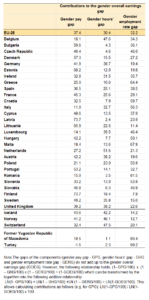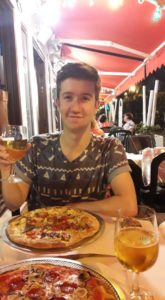I would be interested in discussing the differences in pay gaps across Europe. In particular, to look at the factors that can determine a high or low percentage of pay gap in certain countries, depending on its cultural and political environment.

I would be interested in discussing the differences in pay gaps across Europe. In particular, to look at the factors that can determine a high or low percentage of pay gap in certain countries, depending on its cultural and political environment.

An algorithm is as clever as the person who developed it. Therefore, if a machine is going to learn by itself, what at the beginning is just a small error could become very soon an enormous one.
Due to the increase role new technologies (notably the ones using AI or ML) are having in todays society, even in sectors or areas as legal judgment and social affairs – where a context analysis should be mandatory – it would be very interesting to understand how gender biases are assessed.
The inner danger of these new technologies is that they could worse the stereotypes perception in their negative sense because they are developed by human beings.
I could refer, to stay in the media sector for instance, on how posts appears on social medias, how they analyze our reactions and behavior in order to, at a certain point, better know our inner thoughts than ourselves.
Because, if “human kind cannot bear very much reality” (I do not know what the author meant with the word reality, but I will refer to it – in this proper context – as “given and assumed datas – dogma”), certainly a computer can, and it can go very very far with it as well. What will then the consequences be? What for the price?
I would like to cover gender quotas: which media companies implement them? What types of gender quotas are in place? How effective are these quotas, and how do we judge what makes a quota effective?
Whilst the gender pay gap is something that is talked about all too often in the media and throughout life, that shouldn’t mean it is something we should avoid discussing. Because despite some measures made to close it, it is still a prevalent issue within the workplace – both in media sectors and other sectors of work – as in March this year it was found that at The Telegraph Media Group, women are on average paid 35% less than men.
https://www.google.co.uk/amp/s/amp.theguardian.com/media/2018/mar/26/telegraph-media-group-gender-pay-gap
My name is Oliver Assogna and I am a 3rd year Journalism, Media and Culture student at Newcastle University.
I have lived and studied in Abruzzo (Italy) all my life and specifically, I attended the Liceo Classico – a very demanding school where I studied Latin, Ancient Greek, Philosophy and History of Art along with the more traditional subjects. I have a great passion for literature and the arts and I am a big reader.
I play the piano and I love classical music, opera, ballet and going to the theatre – I currently freelance as a theatre critic for a London-based company. Last year, I worked for a hyperlocal journal called JesmondLocal, mainly covering transport-related news, stories and events. I also host my own radio show on Newcastle Student Radio and work as an Italian translator, transcreator and interpreter.
I am a huge Pescara Calcio fan and I currently write for 90min, a popular football media platform. At school I’ve been the captain of my five-a-side football team for five years and was also part of the volleyball team. In September, I am running the Great North Run (21 km) in aid of Great Ormond Street Hospital.
I really look forward to meeting everyone in Gothenburg – I am sure that the AGEMI summer school is going to be a fantastic experience!

In order to promote gender diversity in an organization, both women and men need to participate in the process. In what ways men can effectively take part in an organizational setting to bring a positive change? Do men need to overcome their own stereotypical gender roles?
For some time there has been a discussion on the use of gender-neutral language or gender-inclusive language, I would like to know the opinion of participants in the course because, for some, this type of language violates the grammatical rules and does not bring anything of significance, whereas for others, is the expression of a need to name what language does not name, with the idea that language is a reflection of society, a society that is not egalitarian.
Talia OLVERA

My name is Yasmin, I’m 20, and about to start my third year of study in Journalism, Media and Culture at Newcastle University in the UK. I consider myself a feminist, and a follower of women’s rights, so I am excited to meet people with similar interests, and bring more depth to my knowledge.
When I am not at university, I take a large interest in animal welfare, and the ivory trade – I was lucky enough to go on safari in Tanzania in 2016, and hope to again next year. I have been heavily involved with the charity CRCL (Cumbria-Rungwe Community Link), which allowed me to host a Tanzanian girl at my home in 2015, and then stay with her in 2016. Myself and my mum are both still involved with the fundraising of the Link, and we recently pledged the idea of setting up menstruation packs, and giving bras to girls in rural Tanzania.
Living in the Lake District in England – which has the most incredible views!! – I enjoy my fair share of walking and photography. I also love documentaries, especially ones from David Attenborough and Ross Kemp – this would be the type of role I would love to pursue as a future career path.
I look forward to meeting you all.
Hello, 
My name is Hannah Whyte. I am 21 years old and I currently study Media, Communication and Cultural Studies at Newcastle University. I am passionate about feminism and promoting gender equality in all areas of my life. The Gender and Media module I took this year has been really enjoyable and I am excited to meet more people who share this interest.
I have a part time job at a cinema and a theatre, and in my spare time I enjoy going out with my friends and watching live music.
How to effectively promote the integration of a human rights-based approach in training for media professionals?
– Barbara